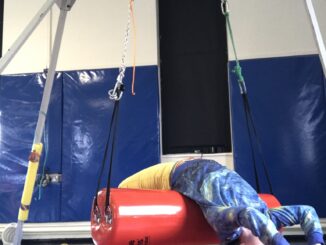This post has an audio and video recorded version for those who prefer to learn by hearing rather than by reading. Scroll to the bottom for the video of me reading it.
“I wish I could let my kids learn to work out their own fights, but it turns from verbal to physical in the blink of an eye. I have to intervene. How could I let them work it out themselves?”
This is one of the questions I get most often! I wrote a couple times last week about my kids (that I’m the mom of) progressing toward being able to verbally work out disagreements and a ton of people asked me this.
First of all — it’s partially a maturity thing. Some of it just comes with time. People who want their 2 or 3 or even 4 year olds to simply work it out verbally, may not have realistic developmental expectations. Maybe this is their first child so the child seems so “big” by now. Maybe they don’t have much experience with toddlers. Maybe they have an older child who was very calm-natured and not very physical when they were this age. Either way, the first thing to know is that it’s *super* normal for young kids to not be able to work out disagreements verbally. No matter how much you try to “teach” them or lecture them or whatever, it will literally just take time. You could lecture them about it every time it happens for probably approximately the same amount of time that it will take them to stop doing it as if you just…didn’t. 😉
Second of all — you build a foundation of them trusting that when fighting gets physical, you will help them stop. The foundation is built on you being their “self-control” until they have the capacity for self-control. *You* are the thing that stops them from fighting physically until they have, internally, the thing that can stop them from fighting physically.
And then the skill grows. One day they’re both toddlers and nobody has any skills beyond “you took my toy, I bonk you so you drop it so I get it back.” Then they start to trust and get mature enough to realize, “Mom will stop me from whacking him and help me talk through my problem.”
Then it goes, “I remember a fragment of what mom usually says. I’ll say that first. Nope, didn’t work, I’m frustrated now, whack— and Mom will help stop me and talk through my problem.”
(I said “Mom” in these sentences because I was picturing myself. But Dad, Baba, Grandpa, my preschool teacher, my occupational therapist…any of them might be the one stepping into this role of being the external “regulation system”.)
Then it’s like “I remember a sentence,” then it’s like “we can argue two sentences back and forth before we hit our frustration limit,” then it’s like “on a good day we can go through 3 arguments before we physically fight,” and always, as with all skills, it’s in flux with their level of tired and hungry and sleepy and dysregulated and whatever other factors.
And the whole time, they’re learning new kinds of verbal power and not just physical power. I can taunt, I can tease, I can name-call, I can threaten. Each of these things are powerful in their own way, and they each have a downside and they don’t build my relationship with this person I love. It is just as normal for kids to experiment with these kinds of powerful verbal play as they do with “i bonk you when you have something I want”.
And then they learn higher and better forms of verbal power too: I can negotiate, I can compromise, I can verbally request help from an adult, I can logically reason.
And all of it comes through practicing a million billion times just like standing and creeping and walking and running and skipping and climbing. Just like any other skill. It just feels like higher and more worrying stakes because it feels like it’s experimenting with emotion and social skills and behavior, and those things are easy to tell ourselves scary stories about, whereas things like physical skills are easier to give kids time and space to learn and play. It’s usually more tempting to say to ourselves “He will never learn to be kind, he will become a taunting and name-calling rude adult if I don’t stop him” while we wait for the child to learn than it is to say to ourselves “He will never learn to walk” while we wait for the baby to learn. But we don’t have to say either. We don’t have to respond to our kids out of our fear.
So the bottom line answer is that it takes a lot of ground work when they’re too young to reason, for them to realize and trust that you’re truly part of their team, that you’re going to help them have the control they can’t have for themselves yet. And if you have older kids who haven’t gotten here for whatever reason — neurodivergence, changing your parenting style later in life, getting kids later in life who you didn’t have to lay the groundwork with — then it’s more complicated for sure. But you can also talk to them about it more in depth than you could the toddlers, too. You can let them know in non-escalated moments that you’re there to help them when they don’t know how to do it themselves yet—in behavior and self-regulation, as in all walks of life.


